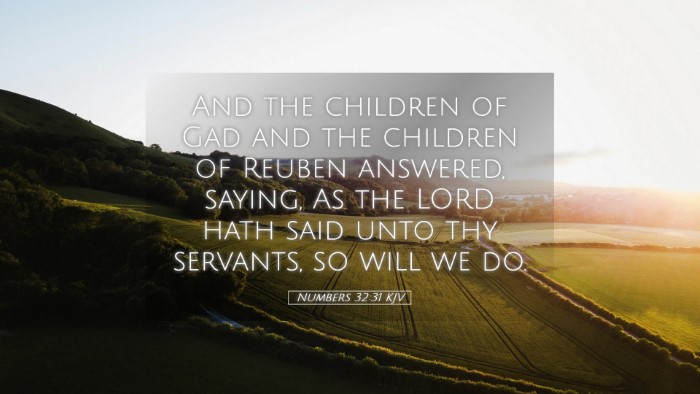Commentary on Numbers 32:31
Verse Reference: Numbers 32:31 - "And the children of Gad and the children of Reuben answered, saying, As the LORD hath said unto thy servants, so will we do."
Introduction
This significant verse occurs in the context of the Israelite tribes of Gad and Reuben requesting to dwell on the eastern side of the Jordan River rather than entering the Promised Land. Their agreement to support their fellow Israelites in the conquest of Canaan is a poignant moment highlighting themes of duty, faithfulness, and communal responsibility.
The Context of the Request
In Numbers 32, we find the Reubenites and Gadites expressing their desire to settle in the land of Jazer and Gilead. Given their large herds and flocks, this land appeared suitable to them. Their request introduces a complex dynamic in the Israelite camp, exposing tensions between personal desires and communal obligations.
Commentary Insights
- Albert Barnes: Barnes discusses the practicality behind the tribes' decision. These tribes demonstrated foresight and pragmatism, recognizing the agricultural potential of the land east of the Jordan. However, he emphasizes that this desire posed risks to Israel's unity. Their choice could have led to a division that the Lord sought to prevent among His people.
- Matthew Henry: Henry elaborates on how the fidelity exhibited by Gad and Reuben reflects their commitment to God's covenant. They did not back away from their responsibilities and were ready to fight alongside their brethren. This commitment is essential for understanding the broader narrative of Israel's journey toward the Promised Land.
- Adam Clarke: Clarke raises an important point concerning their conditional promise—"as the LORD hath said." This phrase recognizes the authority of divine command and underscores their obedience to God's directives. Clarke suggests that the tribes demonstrated their faith not in their own strength but through adherence to God's will.
Theological Themes
Numerous theological themes emerge from this verse that warrant further exploration.
1. Faith and Obedience
The response of the Gadites and Reubenites is an affirmation of their faith. By stating, "as the LORD hath said," they acknowledge their obligation to divine commandments. This obedience reflects a vital aspect of their character, acknowledging God's authority, which is critical for all believers.
2. Unity and Responsibility
There is a palpable tension between their personal preference for land and the collective responsibility to fight for the inheritance of their fellow tribes. The passage shows that while personal desires are legitimate, they must be balanced with communal obligations, demonstrating the importance of unity in the body of Christ.
3. Leadership and Accountability
Throughout Numbers 32, the role of leadership emerges clearly. Moses, as the leader, guides the tribes through their deliberations and ensures that their ambitions align with God's overarching plan. Their willingness to comply reveals their respect for God's chosen leaders, an important lesson in the dynamics of spiritual authority and accountability.
Pastoral Considerations
This verse offers profound insights for pastoral application. Here are several reflections:
- Encouraging Accountability: Pastors can use this passage to teach about the importance of community accountability. Just as Gad and Reuben pledged to support their brothers, congregations must cultivate an environment where members are committed to each other's well-being and growth in faith.
- Balancing Personal Desires with God's Mission: This account encourages individuals to evaluate their choices through the lens of God's mission. As pastors engage with congregants, they can foster conversations about how personal aspirations align with communal faith objectives.
- Community and Service: The commitment expressed by the Gadites and Reubenites serves as a model for church service. Pastors can challenge their congregations to engage actively in service, ensuring that personal preferences do not overshadow collective needs and outreach.
Conclusion
Numbers 32:31 encapsulates a moment of promise and tension as the tribes of Gad and Reuben navigate their identity and responsibilities. By affirming their commitment to the Lord and their fellow Israelites, they model a vital lesson in faithfulness to God's commands amidst personal desires. For modern readers — pastors, students, and theologians alike — this verse underscores the perpetual call to balance individual aspirations with a steadfast commitment to God’s purpose for His people.


